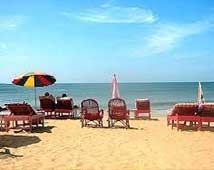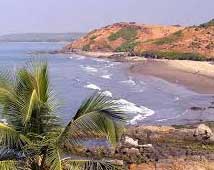
Mapusa (pronounced as Mapsa by the locals) is Goa's third largest town and the capital of the northern Bardez taluka. It is mainly a market town for the surrounding beach areas of Calangute, Candolim, Anjuna and Baga among others. Even its name is thought to be derived from the Konkani word for a measure - "map" and the phrase fill up - "sa".
It is a fairly small town with mostly modern building spread around the slopes of a small hillock called Altinho. It lies about 13 kms from the capital city of Panaji and on most days there is hardly anything to entice the casual visitor to its environs.
But come Friday morning, the whole town has a lively look when the famous weekly Friday Market begins. The market attracts people from all over Goa who come here to buy and sell their wares. Everything from fresh and dried fish, incense, spices, fruits and vegetables to souvenirs from other states of India is available here.
Local Goan specialities such as spicy sausages (chouriços) and the Goan spirits such as toddi and cashew feni are much in demand amongst locals and outsides. Another item to look out for is the magnificent banana crop from the nearby village of Moira. Most of the items are sold after a few rounds of bargaining and the prices are usually much lower than anywhere else.
Most of the items are piled up in heaps on the sidewalks, with most of the vendors being colourfully dressed womenfolk from the nearby villages who come here to sell their produce. The market also draws a large number of foreign tourists from the nearby beach areas who come here to stock up on their provisions.
Mapusa does not have many tourist sites worth visiting. There are a few colonial era Municipal building on the Altinho hill, a fairly modern temple of Lord Hanuman just a few minutes from the main bus stand and most importantly the Church of Our Lady of Miracles about 2 kms east of the market area.
The church is also known as St Jerome's locally and dates back originally from the year 1594 when the first edifice was built. Since then it has been rebuilt several times, most recent reconstruction being in 1961. During the Liberation of Goa that year, the Church was razed by a fire which was allegedly sparked off when the retreating Portuguese army tried to blow up the nearby bridge to stall the advance of the Indian army.

The Church of Our Lady of Miracles has a beautiful gabled facade but is more famous for its annual feast than for its architectural splendour. Since the Church is located on the original site of an ancient Hindu temple, the Hindu community also considers it sacred area. Consequently, in a fine display of communal harmony that exists in Goa, the annual feast held on the 16th day after Easter is enthusiastically celebrated by Christians and Hindus alike.
The other famous shrine is that of Lord Bodgeshwar, located on the outskirts of the town in the middle of some rice fields, which is beautifully lit up at night and draws thousands of devotees for its annual Jatra (festival).